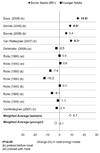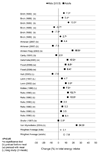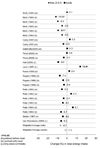Impact of water intake on energy intake and weight status: a systematic review
- PMID: 20796216
- PMCID: PMC2929932
- DOI: 10.1111/j.1753-4887.2010.00311.x
Impact of water intake on energy intake and weight status: a systematic review
Abstract
The effects of consuming water with meals rather than drinking no beverage or various other beverages remain under-studied. This systematic review of studies reported in the English-language literature was performed to compare the effects of drinking water and various beverage alternatives on energy intake and/or weight status. Relevant clinical trials, epidemiologic studies, and intervention studies were identified and findings across the literature were summarized. From the clinical trials, average differences were calculated in total energy intake at test meals (DeltaTEI) for each of several beverage categories in comparison with water. The available literature for these comparisons is sparse and somewhat inconclusive. However, one of the most consistent sets of findings was related to adults drinking sugar-sweetened beverages (SSBs) versus water before a single meal. In these comparisons, total energy intakes were 7.8% higher (DeltaTEI range, -7.5 to 18.9) when SSBs were consumed. Studies comparing non-nutritive sweeteners with water were also relatively consistent and found no impact on energy intake among adults (DeltaTEI, -1.3; range, -9 to 13.8). Much less conclusive evidence was found in studies replacing water with milk and juice, with estimated increases in TEI of 14.9% (range, 10.9 to 23.9%). These findings from clinical trials, along with those from epidemiologic and intervention studies, suggest water has a potentially important role to play in reducing energy intake, and consequently in obesity prevention. A need for randomized-controlled trials to confirm this role exists.
Figures




References
-
- DiMeglio DP, Mattes RD. Liquid versus solid carbohydrate: effects on food intake and body weight. Int J Obes Relat Metab Disord. 2000;24:794–800. - PubMed
-
- Mourao DM, Bressan J, Campbell WW, Mattes RD. Effects of food form on appetite and energy intake in lean and obese young adults. Int J Obes (Lond) 2007;31:1688–1695. - PubMed
-
- Wolf A, Bray GA, Popkin BM. A short history of beverages and how our body treats them. Obes Rev. 2008;9:151–164. - PubMed

